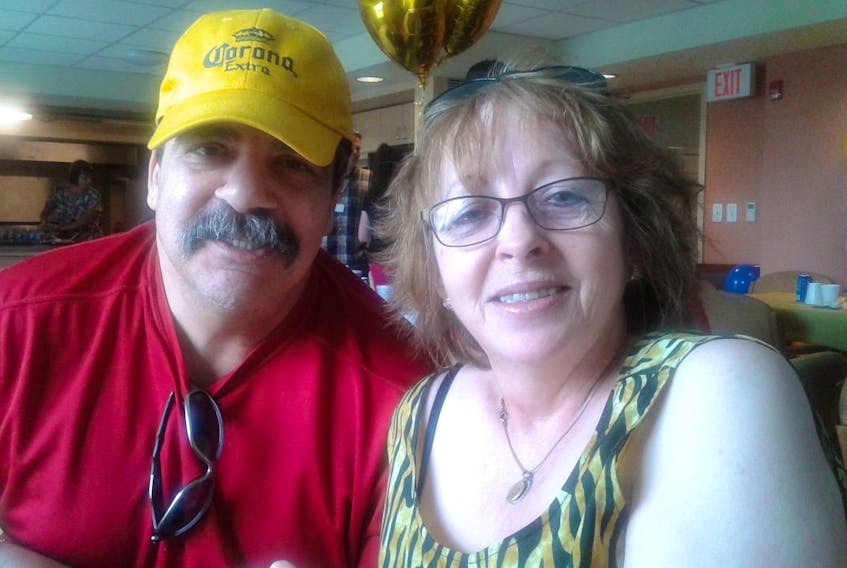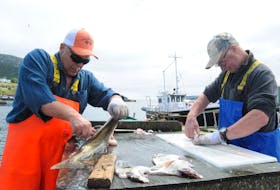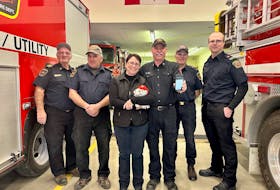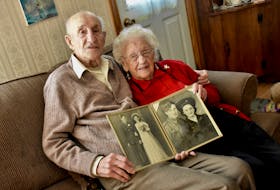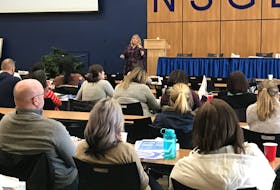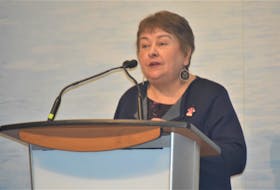LABRADOR CITY, N.L. —

A cancer diagnosis is among the harshest news a person could receive and brings with it, a lot of stress. One of those stresses for people can be travel and that’s certainly true in Labrador.
A group that’s been trying to lessen the worry is the Canadian Cancer Society and their Air Daffodil program. The program helps people in Labrador who have a cancer diagnosis by paying for a couple of return flights a year and one return flight for a companion.
Al Pelley, Regional Director of Corporate Partnerships for the Newfoundland and Labrador Chapter of CCS, said the program started as a pilot project following a meeting he had with cancer survivors in Labrador West.
“They expressed concern to me about the cost of travel for people from Labrador to go for cancer treatment,” he said. “They gave me a number of examples of people who missed their appointments because they simply couldn’t afford the cost associated with it.”
He brought that back to the executive committee in St. John’s and it was decided they should help. They immediately set out to raise funds for the project and managed to raise $75,000 the first year. They went through that quickly, Pelley said, making them realize how great the need is, beyond what they ever imagined.
“We had a better idea then how great the need was, and we started fundraising more for this Labrador-specific initiative,” he said.
They have some great corporate partners, including Provincial Airlines, IOC, Vale and the Labrador Fishermen’s Shrimp Union. Combined with that, communities in Labrador have been pitching in with fundraisers since day one. Even so, the program has had its challenges. In 2018 they ran out of money because the demand was so great. To date they’ve provided 850 one-way flights, Pelley said, and the need isn’t diminishing.
“While we’ve had some big players step up, the demand is that great,” Pelley said. “The community has really gotten behind the program, taken ownership of it and that’s what we wanted to see.”
Patients grateful for Air Daffodil

A cancer diagnosis is a life-changing event and comes with a lot of hardships, including cost.
For those in Labrador there are appointments needed that will take people far from home, to the island and other provinces. As anyone who has travelled to or from Labrador knows, that gets expensive quickly and simply adds to the stress.
Howard Hancock was first diagnosed about a year and a half ago and has had to travel six times for appointments in that time. Some were in Corner Brook, some in St. Anthony and he went to New Brunswick twice. While he was in St. John’s he visited Daffodil Place and was told about the Air Daffodil Program.
“We went in and talked to someone and she told us all about it,” he said. “She booked a flight for me the next day. It was no problem at all.”
Hancock said he couldn’t believe how easy it was to get into the program and how quickly they booked his flight for him. He said he’s lucky he has a good job and can handle the cost but not everyone can.
Hancock said it’s a wonderful program and he hopes more people make use of it. The community support for the program has been great, he said, and he’s proud his fellow Labradorians give so much.
John McGregor echoed Hancock’s sentiments about the program and how simple and easy it is to access.
“They’ve been accommodating, agreeable, forthcoming, wonderful,” he said.
McGregor has had more experience with the program than most, having travelled on it both as a patient and as a companion. His wife, Geraldine Collins, was diagnosed with cancer in 2014 and McGregor was diagnosed with cancer more recently.
They have to travel to St. John’s every three months for treatment, he said, and this certainly helps. It allows them to focus on the treatment, he said, and not have to worry as much about external things.
“The Air Daffodil personnel are very compassionate and so helpful. We’re forever grateful for their much-needed service.”
Fundraisers and partners make Air Daffodil work

A program like Air Daffodil wouldn’t exist without the community partners and fundraisers put on for it.
In 2016 Cal Barrett started a fundraising event in Labrador West, Curling for Cancer, to raise money for the much-needed program.
“A number of my co-workers were impacted by cancer and they were back and forth to St. John’s for medical care and I saw the financial impact that was having,” Barrett said when asked why he spearheaded the initiative.
“I thought it would be a good idea to try to help out and contribute to the cause.”
The Curling for Cancer event has been held in other parts of the country for decades and Barrett thought it would be a good fit for Labrador.
He said the community response has been great, with many local individuals and companies donating time and money. He said they had as high as 32 teams compete and have raised close to $100,000 so far.
Travelling from Labrador to the island can be quite expensive, Barrett said, and they’re happy to help any way they can. The Air Daffodil program is essential, he added, and a great service for the community.
Corporate partners are another essential part of the program and one that’s been on board since the beginning of the program is Provincial Airlines (PAL).
Leslie Hopkins, Community Outreach and Communications Manager for PAL, said Air Daffodil aligns with what they try to do in the community.
“We try to support local charities and programs that are having a positive impact on the health and well-being of families,” she said, “in all communities but especially where we work and where we live. So for us to be able to connect Labradorians to life-saving treatment, we thought it was a fantastic opportunity and we wanted to be involved.”
PAL provides discounts on the flights used by the Air Daffodil program and Hopkins said they would love to be able to do more. They also help in other ways, such as shipping daffodils to Labrador for the Canadian Cancer Society to sell during the month of April, and promoting the program whenever they can.
“All of our customer-facing employees wore daffodil pins this year to help get the word out and support the program,” she said. “We’re very much happy to be a part of this partnership and help spread this message.”
The Iron Ore company of Canada is another important partner for Air Daffodil, coming on board in recent years. IOC provides funding for the program, which IOC director of communications and external relations Heather Bruce Veitch says they were happy to do.
She said IOC is committed to building partnerships that benefit the health and well-being of their people and communities. They are aware of the stresses cancer treatment brings, she said, in addition to the financial burden related to air travel expenses. Partnering with Air Daffodil allows IOC the opportunity to assist residents in the communities with these expenses, she said.
“Partnering with Air Daffodil means one less thing to worry about for those impacted by cancer, and hopefully it will enable them to focus on their health and well-being, which is what’s most important,” she said.

